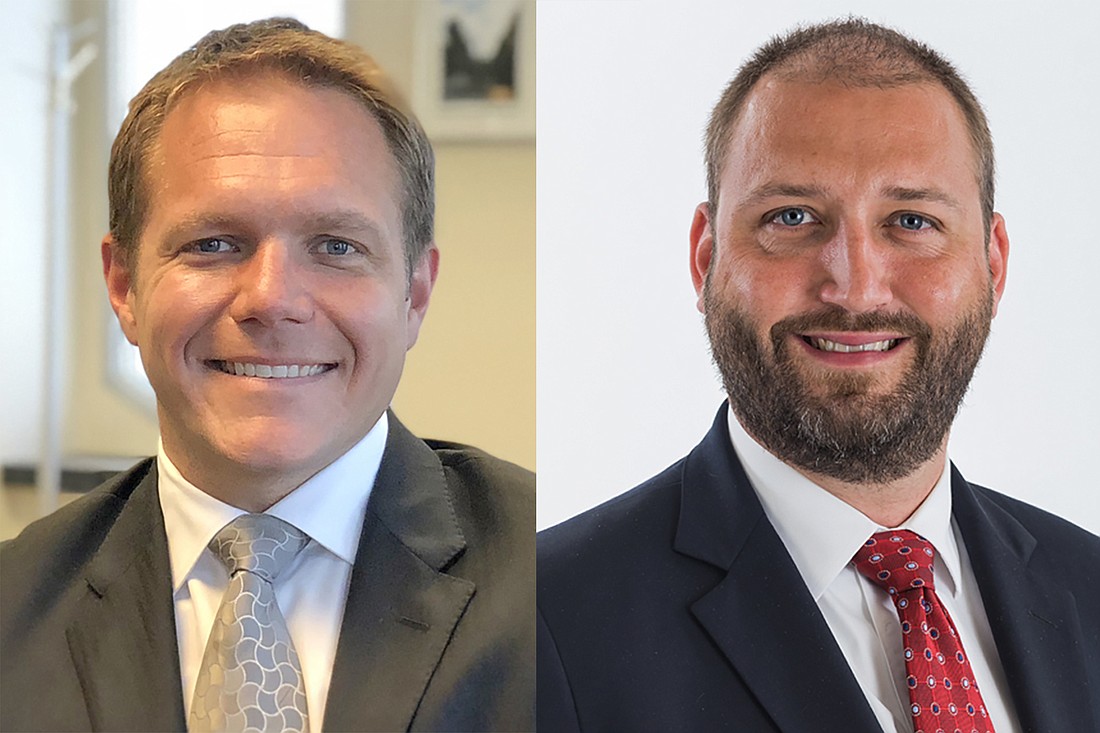
The federal conspiracy and wire fraud cases against former JEA Managing Director and CEO Aaron Zahn and former CFO Ryan Wannemacher for their roles in the attempt to sell the city-owned utility in 2019 may not go to trial until at least March 2023.
Attorneys for Zahn and Wannemacher appeared April 19 at the Bryan Simpson U.S. Courthouse Downtown for the first time since the fired JEA executives formally pleaded not guilty March 8.
Assistant U.S. Attorney Tysen Duva represented the government.
Zahn, 42, and Wannemacher, 40, were indicted March 2 on one count each of conspiracy and one count each of federal wire fraud after a two-year grand jury investigation into the sales attempt. They were not in the courtroom for the hearing.
During the status conference, Duva asked U.S. District Judge Brian Davis for the March 2023 trial date and to set the deadline for pretrial motions in August 2022.
Lawyers for Zahn and Wannemacher asked for a May 2023 trial date.
Zahn’s attorney, Brian Albritton, told the court the defense team needs more time to analyze three terabytes of evidence collected by the government and time to collect their own evidence.
Attorneys James Felman, Katherine Earle Yanes and Brandon Kyle Breslow of the Tampa-based law firm Kynes Markman & Felman and Catherine Licandro of Murphy & Anderson in Jacksonville are representing Wannemacher.
Zahn’s attorneys are Albritton of Phelps Dunbar LLP and Eduardo A. Suarez of the Tampa-based Suarez Law Firm.
Albritton said Zahn’s legal team intends to file a motion for a change of venue to move the trial out of Jacksonville.
Felman told Davis he may file a motion to separate Wannemacher’s case from Zahn’s and suggested dismissing the charges against his client entirely.
He also suggested the government replace the prosecution team and start the case from scratch.
Felman said he also might request Davis to hold hearings where the prosecution must prove that its case is based on evidence collected and not on protected statements made by Wannemacher during employment investigations.
The attorney argued that publicly available statements the former CFO made under immunity as part of the city and JEA’s employment investigation in late 2019 and early 2020, as well as statements made to attorneys conducting the City Council’s investigation into the JEA sale attempt, would taint a trial and the federal case.
Those interviews led to the firing of Zahn and Wannemacher by the JEA board.
The former executives gave depositions to the city Office of General Counsel and to Council investigators led by the Jacksonville law firm Smith Hulsey & Busey.
Under federal criminal procedure, government employees taking part in an employment investigation may be immune from prosecution.
Wannemacher’s attorney noted the statements were made available online as public documents and disseminated by the media.
“It is like placing a drop of ink into a glass of water. I don’t think that taint can ever be removed,” Felman said.
Suarez cited publicity in his argument for moving the trial.
Duva told the court the government’s case relies on other admissions, independent evidence and testimony.
He said the two-year federal grand jury investigation into the JEA sale produced 30 subpoenas for statements and documents and 23 witnesses testified.
Duva said Florida Power & Light Co. and parent company NextEra Energy Inc., which was the highest bidder to buy JEA, were among those subpoenaed.
He said Zahn admitted to creating an employee bonus plan, which is at the heart of the government’s case, during a public hearing in December 2019 led by City Council members Rory Diamond and Ron Salem where the former JEA executives did not have immunity.
The federal indictment alleges Zahn and Wannemacher worked together to devise a Long-Term Performance Unit Plan that would have paid them and other JEA executives and “certain others ”at least $345 million in bonuses had the utility been sold.
Duva told the court that spreadsheets about the bonus plan were found as part of the government’s investigation and not from immunized testimony.
Davis said he will soon file orders responding to the defense’s requests.